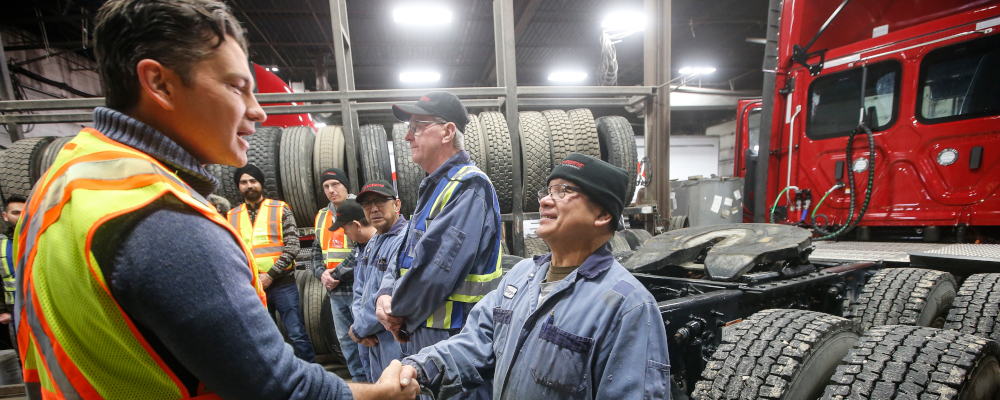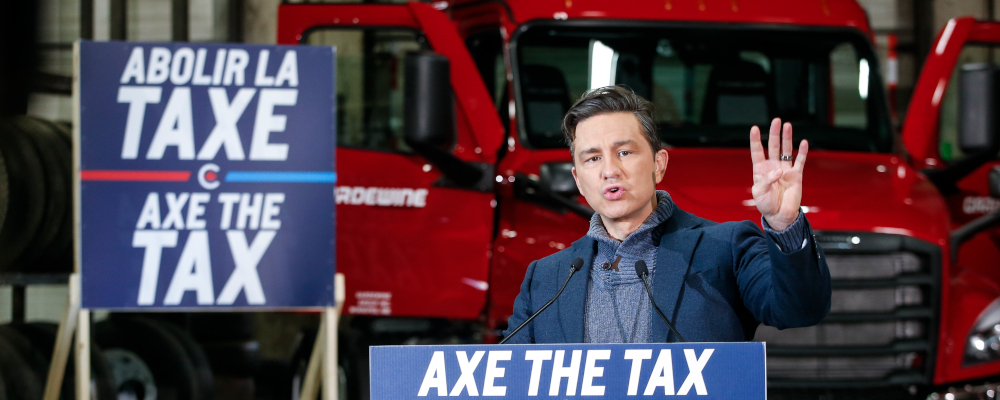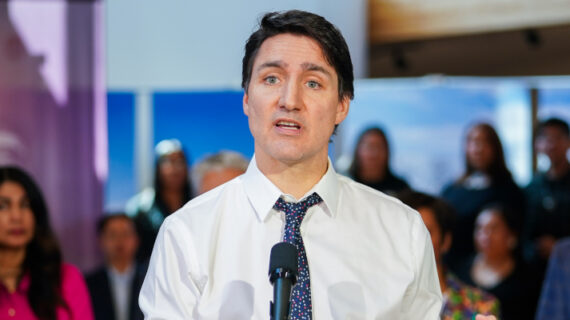This week‘s edition of The Hub’s Weekly Wrap reflects on some of the past week’s biggest stories, including Pierre Poilievre’s rhetoric deriding the corporate class and championing the working class, political developments around the carbon tax, and what the ongoing revelations of the ArriveCan scandal tell us about the inherent limits of government.
Poilievre’s speech signals a fundamental realignment in Canadian politics
Pierre Poilievre’s speech last Friday to the Greater Vancouver Board of Trade continued to generate a lot of discussion over the past week. It was a notable speech for various reasons, including as he himself noted, it was the first time that he’s addressed a senior business audience since he became Conservative Party leader just over 18 months ago.
His dismissive comments about corporate lobbyists and strong support for the working class have prompted a lot of questions about what the speech might tell us about Poilievre’s politics and the positioning of a possible Poilievre-led government. For instance, Ginny Roth wrote this week for The Hub about its economic policy implications including the extent to which these populist impulses might conflict with Poilievre’s otherwise orthodox economic views.
The speech must be understood as part of a broader trend within Canadian Conservative politics in particular and conservatism across the Anglo-American world more generally. It was an expression of a major political realignment.
Within Canadian conservatism, it reflects a process that started under Stephen Harper’s leadership and has accelerated since his departure. The growing distance between the Conservative Party and the country’s business establishment is a marked departure from the politics of the Mulroney era.
There are various factors behind it. One is quite practical: the elimination of corporate donations in the early 2000s has led to a decline in the voice and influence of business leaders. Second is a populist tilt in Conservative politics that manifested itself in the Reform Party and persists to the present in the modern Conservative Party. Third is a perceived leftward shift in the corporate community—particularly on issues concerning identity and sexuality—that makes it less of a natural ally to the Conservatives.
But, as mentioned, these trends cannot be understood as a merely Canadian phenomenon. They’re part of a bigger story of a political realignment occurring across the Anglo-American world in which centre-right parties are increasingly home to working- and middle-class voters and centre-left and even progressive parties are now representative of the professional class. (We have covered the political realignment in various episodes of Hub Dialogues including with David Frum, Eric Kaufmann, Patrick Ruffini, and the late Ed Broadbent.)
Poilievre’s speech was an inherently realignment one. In particular, his message about the working class (“when I’m prime minister, my obsession—my daily obsession—will be about what is best for the working-class people of this country”) signaled that a prospective Poilievre-led government would consciously situate itself in these broader political trends. Like in Great Britain or the United States, the centre of gravity within Canadian Conservative politics is shifting from an entrepreneur to the wage earner.
What’s interesting though about Poilievre’s realignment strategy is that it’s been part of a mostly orthodox conservatism. His overarching message is still generally about freedom and free enterprise. He hasn’t made major policy deviations from a basic conservatism framework with the exception of recently voting in favour of a legislative ban on replacement workers.
It may be that a lot of these unconventional Conservative voters are mainly motivated by an aversion to the rise of identity politics on the Left and therefore have somewhat limited expectations from Poilievre and Conservatives on economic or social welfare policies. If so, it’s highly probable that his nods to “anti-wokeism” will remain a key part of his overall message and priorities.
The upshot: political observers are right to characterize Poilievre’s speech as significant not merely because of what it conveys about him and his politics but also because of what it signals about bigger changes in Canadian politics. We’re going through a realignment. It will shape the next election and define our politics for the foreseeable future.

Trudeau’s carbon tax quandary
One of the biggest stories of the week is the growing opposition to the scheduled increase in the carbon tax from $65 to $80 per tonne on April 1. A majority of provincial premiers, including Newfoundland and Labrador’s Liberal Premier Andrew Furey, are now calling on the Trudeau government to suspend the tax hike in the face of ongoing affordability concerns.
Prime Minister Trudeau and his government have resisted those calls (Finance Minister Chrystia Freeland called them a “net negative”) and rejected claims that their special dispensation for home heating oil late last year creates a fairness expectation for broader relief from the carbon tax.
In light of these political developments, there’s been commentary in recent days about the causes of the carbon tax’s ongoing unpopularity, including the extent to which the government has mishandled the communications. The prime minister has also sought to make a policy argument that his government’s carbon tax (which uses price signals to influence business and consumer behaviour) is more market-based and less state-directed than the Conservative Party’s plan.
There may be a communications challenge with the federal carbon tax but the chief problem isn’t that the government hasn’t spent adequately on advertising. It finds its origins back in 2015 when the Liberals weren’t fully transparent about their policy intentions. It may have avoided difficult questions in the election campaign but in hindsight, it laid the groundwork for the public’s disapproval nearly a decade later.
In a major speech in Calgary in February 2015, Trudeau distanced himself from the top-down impulses of the National Energy Policy and instead committed to a bottom-up climate policy in cooperation with the provinces that could include carbon pricing (“We will set a national standard in partnership with provinces and territories, one that gives them the flexibility to design their own policies to achieve those targets, including their own carbon pricing policies”). The party’s platform used similar language. The clear implication was that a Trudeau-led government would support provinces that adopted carbon pricing but it was far from clear at the time that it would become a non-negotiable expectation.
The consequence is that the 2015 election didn’t really litigate the Liberal Party’s carbon tax. How could it? The party’s policy, as presented during the campaign, broadly matched the Harper government’s own approach in which B.C., Quebec, and Ontario had carbon pricing and other provinces didn’t. If the Liberals had been straightforward that they intended to impose a national carbon tax with essentially no flexibility for the provinces, one cannot help but think that the 2015 election campaign would have taken on a different dynamic.
As for the prime minister’s latest claims about the market orientation of the carbon tax, they’d represent a semi-persuasive argument, including presumably among conservatives who ought to generally favour market-based incentives rather than command-and-control regulations and subsidies, but that’s of course not what the Trudeau government has delivered.
Carbon pricing (including both the consumer and industrial prices) represents something like 20 or 25 percent of projected emissions reductions over the coming years. Regulations and subsidies are doing most of the heavy lifting. Keep in mind that this a government that has announced billions of dollars in subsidies to essentially create an electric vehicle industry in the country and remains committed to a sectoral emissions cap for the oil and gas industry.
The reality is that the Conservatives and Liberals broadly agree on climate policy with the major exception of the consumer carbon tax, which represents a small and declining share of emissions reductions. They’re both prepared to regulate and subsidize in order to reach the country’s emissions targets—in fact, given that the Trudeau government’s emissions targets are more ambitious than the Harper government’s, there’s a good case that it’s even more prepared to use regulations and subsidies than the Conservatives.
One way to think about it is: the politics of federal climate policy is a version of the 80:20 rule. There’s a consensus, for better or for worse, on about 80 percent of climate policy and a disagreement about roughly 20 percent of it.
We effectively have a bi-partisan consensus in favour of regulating and subsidizing our way to something approaching our climate targets. When we look back with hindsight, there’s a strong chance that this week’s mounting opposition to the carbon tax will be seen as having further solidified that consensus.

Ottawa is too incompetent to be corrupt
This week’s parliamentary committee testimonies of the two principals behind GC Strategies, the company at the center of the ArriveCan scandal, focused a bit unexpectedly on the self-evidently fake testimonials on its website from government officials like the chief information officer or chief data officer of Canada. But these exchanges between Conservative MP Michael Barrett and first Kristian Firth and then Darren Anthony weren’t a digression from the main issues behind the ongoing scandal.
They reflect the principal problem: federal procurement has become gamed by empty-shell companies—including ones specifically created to arbitrage affirmative action policies—who’ve stripped out significant margins for themselves and then passed off the work to others.
The web testimonials convey the lack of seriousness and rigour inherent in the federal procurement process. It’s as if Firth and Anthony weren’t self-conscious at all that their rent-seeking would face much scrutiny from government officials. They knew Ottawa was an easy mark.
Launching the company (which they admitted they named after the Government of Canada) in 2015, they pulled together some buzzwords about “visionaries” and “strategic thinking” and “value for money” and some equally banal bureaucratic job titles and that’s all they seemingly needed to do to win hundreds of millions of dollars in government contracts and be named one of Ottawa’s fastest-growing companies within just three years.
The whole episode seems to be shockingly simple. At least for now, there doesn’t appear to be evidence of government corruption. It’s rather a case of institutional ineptness and ultimately government failure.
The fake testimonials should be understood as a symbol of Ottawa’s broader state capacity problem. If the federal government is prepared to award major contracts to a two-person company that cannot even be bothered to make its contrived customer endorsements semi-plausible, how much confidence should Canadians reasonably have about its ability to bring an end to the internal combustion engine or national poverty or any of the other incredible goals that it has set out for itself? The answer is virtually none.
In this sense, Firth and Anthony may be the inadvertent faces of a renewed libertarianism—a rediscovered skepticism of big government—in the country. Their extraordinary testimonies this week should remind Canadians of the inherent limits of state action and the need for clear constraints on the size and scope of government.
If so, the $19 million or whatever they ultimately received for the ArriveCan contract, may have actually been well spent. There’s a real testimonial to add to their website.




